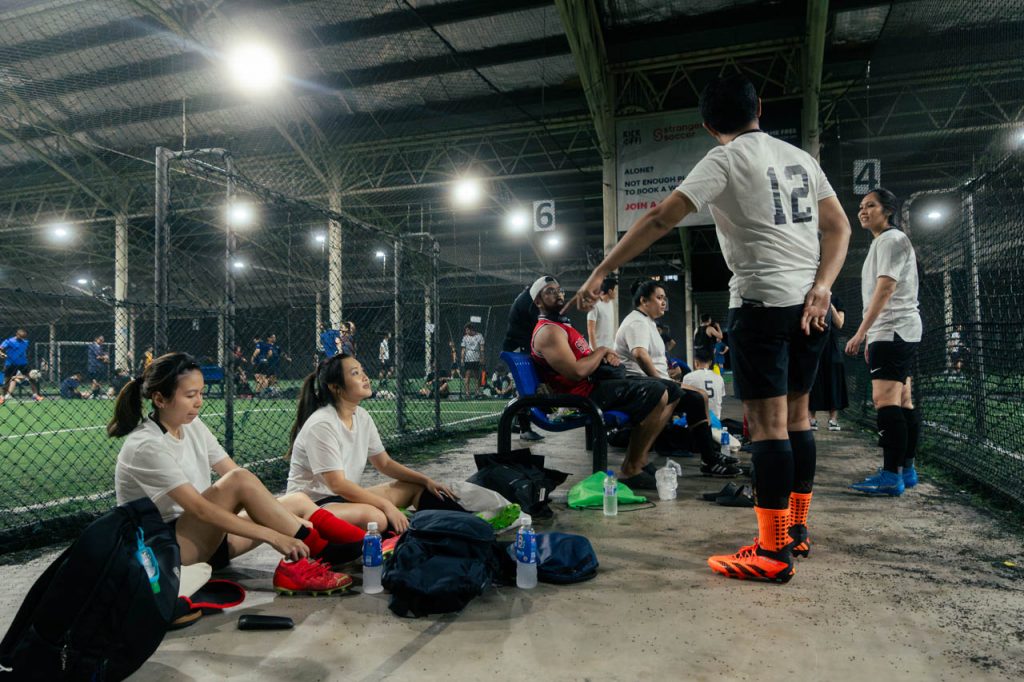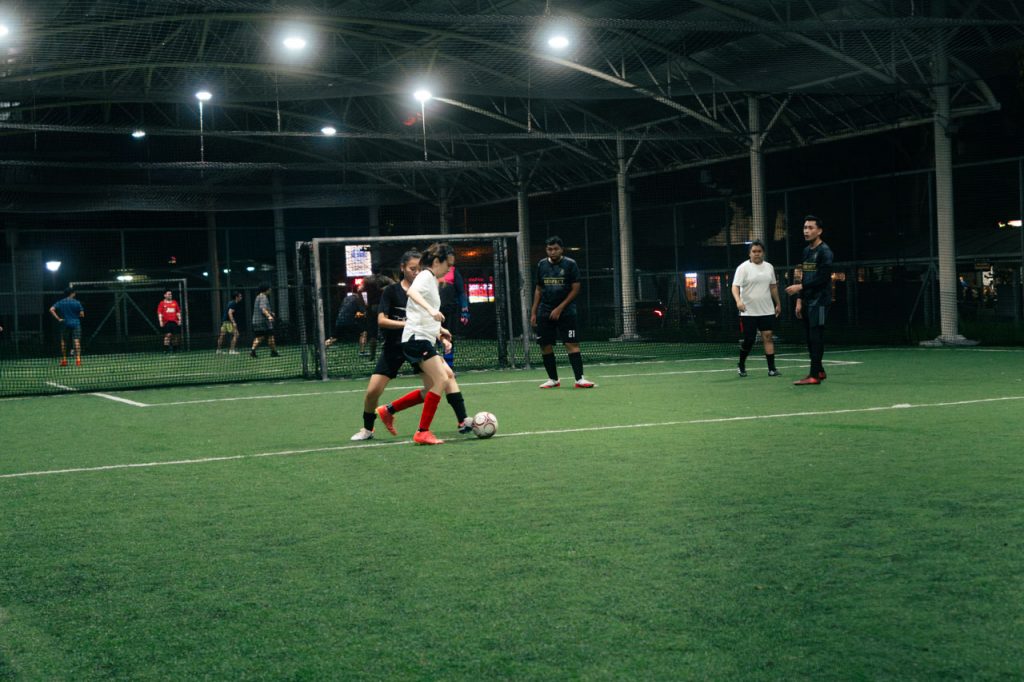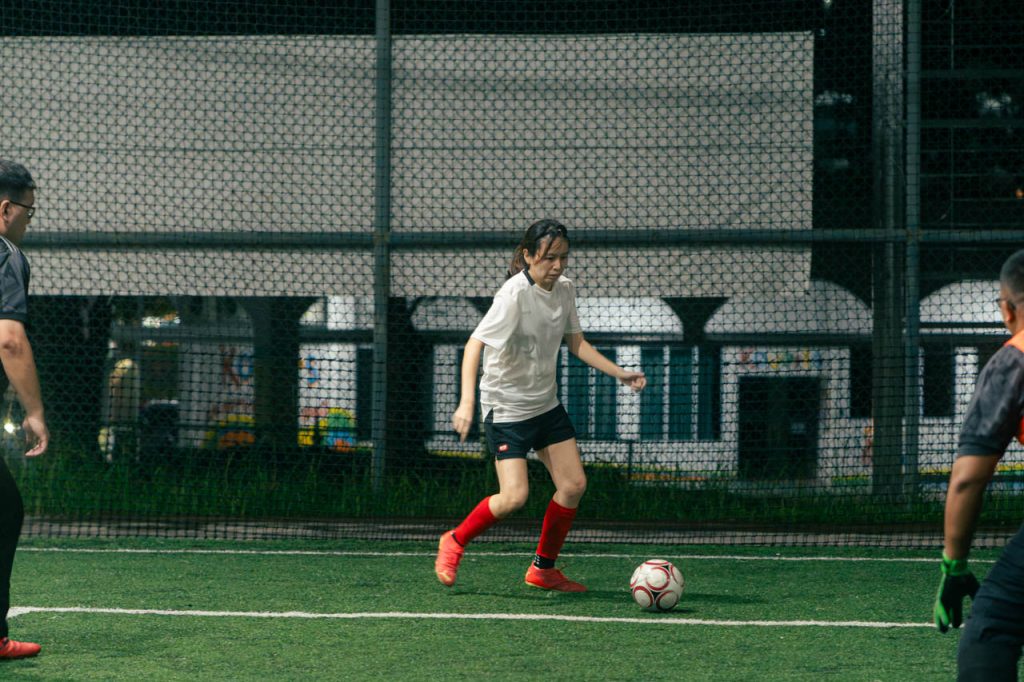All images by Stephanie Lee for RICE Media
“Beautiful!” A woman’s triumphant yell cuts through the typical futsal pitch cacophony of shuffling feet, balls being punted, and rattling cages.
Her team had just intercepted the ball, and it found the striker. The opposing team’s goalie rushes out from between the posts, but that proves to be a mistake. The striker taps the ball with her foot just so, and it rolls in between the legs of the goalie.
The stakes aren’t very high. At this point, they’re already leading 20-1. But the scoring team erupts in celebration nonetheless.
Because it’s scored by a woman, this goal is counted twice. This final goal of the night will take them to a scoreline of 22-1.


This isn’t a typical futsal match. Two teams are gathered at Kick Off! in Kovan on a balmy Thursday night for D2D Sports’ Mixed Fives league. If it wasn’t already obvious from its name, the league sees mixed-gender teams battle it out in weekly five-a-side futsal matches.
Tonight, it’s Futsal Kakis FC versus PSG FC. No, not the French football club, Paris Saint-Germain. This local club’s name actually stands for Papa Sakit Gigi (Malay for father having a toothache).
The league is notable for several reasons. First, this is Singapore’s very first co-ed futsal league. Second, it has several novel rules applying to its female players: Each goal scored by a woman counts as two goals, and any direct free-kick fouls on women will result in a penalty kick instead.
And, obviously, since it’s a co-ed league, each team has to have at least one woman playing on the pitch at all times.
When Accommodations Look Like Sexism
These rules have been nothing short of divisive since Mixed Fives kicked off on October 26th.
For some online commenters, at least, the subtext is this: Women are weaker. Women are less likely to score goals. Women need to be coddled.
Grace Ke, a recreational football player of eight years, called the rules sexist in a TODAY column, writing: “Equality is simple: The rules should be the same for both men and women. Scoring goals takes skill and effort for any player. Injuries hurt the same for any person.”

But from the moment the mixed league was conceived by D2D, I’d say they were in a sticky predicament. In other words, damned if they do, damned if they don’t.
Would they have rustled up enough participants to get the recreational league off the ground if they hadn’t introduced these rules to prevent the possibility of aggressive play?
Rasvinder Bhullar, the executive director of D2D, is doubtful.
The 39-year-old cites feedback from female players that they’re interested in playing in the league—but they’re afraid for their own safety.
“When you play in a league, there are some things on the line, even if it’s not a cash prize. There are trophies, medals, and pride at stake. All that comes into play, and sometimes people lose it.”
He would know. He’s been working to better the local amateur football scene for over 10 years, first as an allied educator at Hougang Secondary School, where he helped to re-establish football as a co-curricular activity.
He then joined D2D in 2011 and mooted several futsal leagues. Among his initiatives are the Golden League for veteran teams with players aged 35 and above, and the Women Futsal League for, well, women. Dealing with intense situations when tempers run high (he’s had to disqualify teams for coming to physical blows) at matches isn’t new to him.
While Grace seeks equality, which she defines as no special concessions made for either side, I get the feeling that Rasvinder is more concerned with equity. He’s aware that men and women are built differently—and seen differently—and hopes to level the playing field with his rules.
Given the heat D2D has taken online for the Mixed Fives rules, I expect Rasvinder to bristle at the topic. Instead, he’s forthcoming and assures me that he’s taken Grace’s critique to heart.
Though changing the rules mid-league isn’t an option, he will consider amending the rules for future editions of the mixed league. He’s gathered from the teams that most of them prefer the double goals for women rule. Four teams are for it. Two are against it but didn’t specify why, Rasvinder says.
Most teams are also open to having two female players starting at all times. The teams, however, are divided on having direct free-kick fouls result in penalties. This last rule, however, is rarely invoked anyway.
As it stands, Rasvinder upholds the way he’s done things for Mixed Fives’ very first edition.
He breaks it down for me. The most glaring difference from single-sex leagues is the rule awarding women two goals for each goal scored. This isn’t meant as a handicap because women are somehow weaker or worse at scoring. It’s meant to ensure that mixed teams are incentivised to field women front and centre.
Each team has to have at least one woman on the field at all times. But Rasvinder foresees that this might not be enough to encourage the teams to feature their women prominently in their lineup.
“They could get a less important role in the team just to make up numbers. I want the female players to be able to get the limelight.”
I have to admit, the rules did give me some pause. But hearing his intentions behind it, I can appreciate the rationale.

Anatomical and physiological differences between men and women are one thing. Stereotypes are another.
Men’s football simply gets more eyeballs. At the World Cup stage, men enjoy higher viewership and higher pay than women. There’s a natural assumption that it’s because men are better at football than women. But that isn’t true.
Rather than any objective difference in performance, people’s preference for watching men play—whether consciously or not—may have more to do with gender stereotypes. Researchers at the University of Zurich found that people rated male players’ performance higher only if they were able to discern their gender. When videos of players were blurred to obscure their gender, their performance ratings didn’t differ significantly.
In other words, men aren’t always better at football than women. We just assume they are.
It’s a Girl’s Game
Indeed, with the rules in place, it’s the women running the show when I turn up at the pitch to watch underdogs PSG FC take on Futsal Kakis. There are a total of six teams taking part in the league, and PSG FC is attempting to claw its way up from the bottom of the table. On the other end of the pitch, Futsal Kakis have a different goal: To widen the goal difference and cement their spot at the top.
Futsal, while pretty similar to football, has fewer players, a smaller pitch, and slightly different rules. Stamina-wise, it’s much more manageable for beginners since you aren’t sprinting up and down a full field.
But tighter quarters mean players have to be skilled at ball control. It isn’t brute power that will give you the edge; it’s technique.
There’s a visible difference in both team’s strategies. Futsal Kakis, which has been dominating the match from the get-go, has six women on its roster and maintains a majority-female lineup for the entire 40 minutes. The team has been playing together recreationally since 2016, though this is their first co-ed league.
PSG, on the other hand, has one female player, 21-year-old Nur Syazlin, on the field for most of the match. I found out from her after the game that this was her very first Mixed Fives match.
“It was a last-minute thing. They called me, and I had nothing to do, so I came down to play,” says the bright-eyed youth.
In the second half of the game, perhaps as an attempt to put a cap on the rapidly widening scoreline, Syazlin takes over goalie duties. She makes several bold saves, diving straight at her opponents’ feet to secure the ball. She’s fearless.
Towards the end of the match, PSG makes several last-ditch attempts to salvage the game. At this point, with Futsal Kakis some 20 goals ahead, it’s not a matter of turning things around but rather trying to narrow the gap. Sliding tackles are forbidden, but one of PSG’s male players goes in for one in desperation as one of Futsal Kaki’s female strikers gets a little too close to scoring.
Fortunately, he misses and no one gets hurt. It’s probably the only instance of aggressiveness—if you can even call it that—in the entire match.
It’s a valiant effort, but the scoreline is beyond saving.
Of Strategy and the Lack Thereof
With most of Futsal Kaki’s 22 goals that night scored by women, I begin to wonder if the women even need the special rules in the first place. After all, they seem to be holding perfectly well on their own.
For all the online vitriol, I expected to get strong reactions to the rules from the players themselves. But none of the male or female players I spoke to were fussed about the rules.
PSG’s Muhammad Farhan tells me that at the end of the day, it’s about having fun together, regardless of the rules.
“Female or male, we play together as a team,” the 26-year-old says. “We respect the opponent and do not underestimate anyone.”
While the Mixed Fives rules are an afterthought for PSG, Futsal Kakis has unapologetically used the rules to their advantage.
Team captain Izyan Syazwan tells me that while women are generally physically smaller than men, the rules give them the edge.
“We let the ladies play more. So when they score, it’s times two. So that’s the advantage of it.”
Futsal Kakis’ Cherly Kwan, 31, concurs. “I would definitely prefer two goals for each goal that a woman scores. It’s definitely an incentive.”
While more experienced female players wouldn’t hesitate to sign up for a league without any of Mixed Fives’ special rules, amateur players might hesitate, she shares. After all, run-ins and tackles from someone physically much larger can cause all sorts of serious injuries, like fractures.
“Actually, I feel that the rules are very encouraging. Perhaps moving forward, there can be more tweaks along the way,” she adds.
Izyan compares Mixed Five’s unorthodox rules to the ones in King’s League, a Barcelona-based football league started by Gerald Pique. It features special rules such as tie-breaker penalty shootouts, unlimited substitutions, and special celebrity guest players.
While it isn’t exactly the same futsal game that people might be used to, Mixed Fives is a way of injecting fun and dynamism into the game, he contends.
No harm, no foul. Just pure strategy.
Indeed, Futsal Kakis’s success in the league so far shows that playing to the league’s rules and having female players on your team are assets. A trump card, even.
Between a Rock and a Hard Place
As I speak to more players, it’s evident female players have more to contend with than the leagues’ rules.
“Mixed-gender futsal matches in Singapore are on the rise, but sexism within the local football scene is still rampant,” Grace puts forth in her TODAY column.
“When female players join a game with predominantly male players, we have to first prove our worth in order to be taken seriously.”
Syazlin and Cherly, too, both acknowledge the fight to prove themselves. Though things have been improving for women in the futsal community, people wouldn’t take female players seriously, they both say.
Even as a kid playing recreational games in her neighbourhood, she’d be the last to be chosen because she was a girl, Cherly recalls.
“A few years ago, the mentality or the stereotype would be that females cannot play. People would say, ‘I don’t want a girl on my team.’”
Like it or not, stereotypes of women in sports exist. But is the best way to deal with it to make special accommodations for women? In making these accommodations, are you just singling women out even more? Or are you taking baby steps to a more equitable playing field?
Even among regular soccer players, there isn’t a single consensus. Grace makes some salient points when she says that rules of any kind should protect both men and women, with no special concessions made for either side. But Cherly sees the Mixed Fives rules for women as a way to lower the barrier to entry and push more of them to sign up for the league.
Good Intentions
What’s certain is that Mixed Fives has stirred up a lot of conversation on the subject of co-ed sports within the futsal community, and even within the teams.
Izyan is well-meaning when he tells us how he usually deals with having women on the opposing team outside of Mixed Fives.
“When I’m playing with the female players, I will actually try to tone it down a bit because I’m scared when I’m being more physical then it might injure them.”
It’s a common sentiment among co-ed sports: That men going easy on women is the ‘respectful’ thing to do. Again, it’s a subject of considerable debate with no definitive answer. Some women might find it gentlemanly. Others hate the feeling of being coddled or seen as lesser than men.
It’s funny. Beside Izyan is Cherly. Directly opposite him are our photographer and video producer—all women. There’s a collective shift in the air as we all pause to consider how we feel about his statement.

“Cherly, what do you have to say to that?” Eudea, our video producer, prompts.
“You shouldn’t lah. Just come at me,” says Cherly, nonchalantly.






